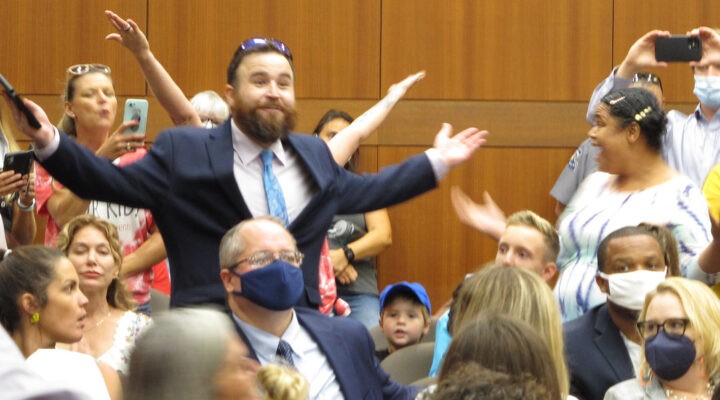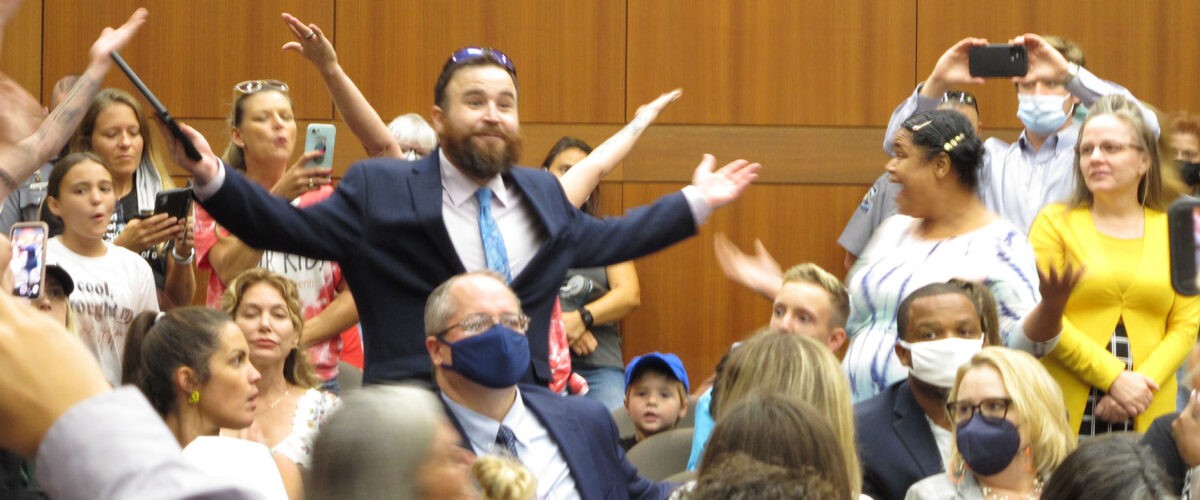Concerned Americans — including people of faith — must “change the narrative of how things are going” in the debate over public education, according to a veteran educator who recently resigned as superintendent of a top-rated Texas school district.
“Let’s move back public education to the place it should be,” Jeannie Stone urged about 150 people attending a panel discussion on “CRT, Book Bans and Me” at Wilshire Baptist Church in Dallas April 19. Stone last year suddenly resigned as superintendent of Richardson Independent School District, one of the largest districts in the state which serves part of northeast Dallas and the suburban city of Richardson.
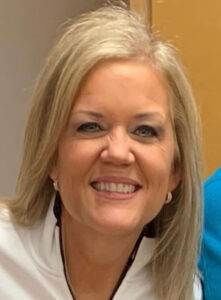
Jeannie Stone
Stone was joined on the panel by Charles Foster Johnson, a Baptist minister and executive director of Pastors for Texas Children, and Casey Boland, a teacher at Lake Highlands High School in Richardson ISD who was raised partly in Bangkok as the child of Southern Baptist missionaries and is a lay leader at Wilshire.
The event was moderated by George Mason, senior pastor at Wilshire, and co-sponsored by a nonprofit he leads called Faith Commons.
“An educated citizenry is vitally important to democracy,” Mason said at the conclusion of the event. “This is not all about training people to make a living in the world. … It’s about the whole human being. This is a public good.”
Then echoing the words of all three panelists, Mason urged those present from the church and community to “become more politically active and vote.” He also urged them to “be active in supporting access to voting.”
CRT debate ‘just took over’
Stone told part of her story, recounting the first time she heard an angry parent show up at a school board meeting talking about “CRT.” That label is short for Critical Race Theory — an academic construct used mainly in law schools but that has been converted to a catch-all critique of concerns about teaching children on history, race, gender and sexuality.
She listened to the initial complaint at the school board meeting and thought the speaker was talking about another educational concept also called CRT. That’s how far removed she and most other educators were from thinking about the thing they were being accused of promoting.
The nationwide furor over Critical Race Theory “came up so quickly and just took over,” Stone said. Parents and non-parent community members using this issue have “taken over and hijacked” school boards, she added. Stone resigned her position during the heat of criticism from a small but vocal group of parents who opposed mask mandates due to COVID, as well as the district’s much-lauded equity and diversity initiatives.
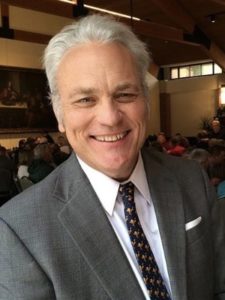
Charles Foster Johnson
Regarding CRT, Johnson said it is no coincidence that the same language is being used across the state and nation to “sow chaos” over issues of history, race, sexuality and gender. This is part of a national political strategy supported by Charles Koch and a conservative activist named Christopher Rufo, he added, referring to Rufo’s own admission that he intentionally weaponized the phrase “Critical Race Theory.”
In March 2021, Rufo wrote on Twitter: “We have successfully frozen their brand — ‘critical race theory’ — into the public conversation and are steadily driving up negative perceptions. We will eventually turn it toxic, as we put all of the various cultural insanities under that brand category. The goal is to have the public read something crazy in the newspaper and immediately think ‘critical race theory.’ We have decodified the term and will recodify it to annex the entire range of cultural constructions that are unpopular with Americans.”
And that is exactly what has come to pass with a small group of vocal critics showing up at school board meetings and sowing doubts about public education, the panelists said.
‘They have a phone. They can look it up’
Boland, who for two decades taught AP U.S. history and now teaches African American studies, said: “I have yet to have a conversation with anybody upset about (CRT) who can tell me what it is.”
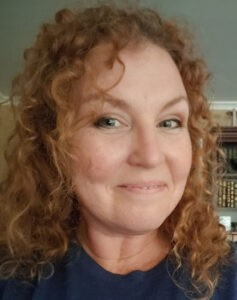
Casey Boland
And the thought that banning the teaching of certain historical facts in public schools might work with teenagers is laughable, she added. “They have a phone. They can look it up.”
In her experience, high school students don’t feel guilty about America’s racist history, as CRT critics claim, but are “angry that we haven’t taught them these things.”
Even as a veteran history teacher, she now understands that she previously taught “a lot of white guy history” and missed other important parts of the story. “The history of the United States is not the history of the color of your skin.”
Mason noted that from a theological perspective, feeling bad about wrong actions might be a good thing. To which Boland quipped that as a student herself, “calculus made me feel like a horrible person.”
She and others earlier referred to the gap that exists between the aspirations of the Declaration of Independence and the realities of American history. Even Thomas Jefferson aspired to more than he lived out, Johnson declared. “Jefferson’s practice isn’t as great as his dream.”
The achievement gap and empathy
In her own journey to become a champion of diversity and equity initiatives, Stone said, she was motivated by the “wide achievement gap” found in her district, with students from wealthier homes faring much better than students from lower-income or otherwise disadvantaged families.
Johnson added that this conversation quickly becomes about race because of the inequities of the American economy. “We have a debate right now: Can Black and brown people inherit the American dream?”
“We have a debate right now: Can Black and brown people inherit the American dream?”
Mason added his observation that in the way the public school debate gets framed today, “if we pay attention to the lived experiences of people of color, we are being divisive. … In order to bring everyone together, we’re not going to talk about those things.”
Yet these are conversations students and parents and communities must have, Stone added, citing empathy as the main driver of equity and diversity initiatives in public schools. “Empathy is a really good thing to instill in kids. There’s strength and growth in that.”
And when school districts like her former employer say they want to welcome all students, they must make plans to do just that, she added. “All means all.”
Getting to that understanding was a journey for her, she admitted, and it was a journey fueled by listening to the parents of students “who wanted us to focus on the things that would change outcomes for their students.”
At Richardson ISD, “we were very bold in putting in policies that benefited all students. … It was not a problem until it was, until it got called Critical Race Theory.”
Book bans
The panel also addressed the issue of book bans, something prevalent in the national critique of public schools but especially in Texas, where a state lawmaker has created a list of 500 books he wants removed from all school libraries.
Stone said her former district — like all public school districts — has policies and procedures in place to review any library book that is called into question. This process is nothing new.
Yet Johnson charged that allegations of school libraries containing pornography and hidden messages of Critical Race Theory is political theater and leads to bad government.
“A top-down government initiative out of Austin or Washington to tell … children what they should be reading is nuts.”
“A top-down government initiative out of Austin or Washington to tell … children what they should be reading is nuts,” he said.
Instead, local school boards and teachers and administrators should be in charge of their own libraries, he said.
A return to trust
Mason asked the panelists how they would respond to those who insist parents should be the ones to determine what public schools teach their children.
What’s missing today is trust, Stone said. “Prior to CRT taking over, we saw trust, we saw partnership,” she explained. “I am hopeful the pendulum goes back the other way. Trust has to come back.”
Despite the significant challenges faced by public educators today, the panelists agreed that they remain hopeful.
“I think we’re going to get through this,” Johnson said. “We’re going to find the better angels of our nature.”
However, getting there likely will include another rough two years and some “brutal elections,” he predicted.
Related articles:
What the Critical Race Theory debate has to do with Professor Harold Hill | Opinion by Mark Wingfield
From Texas to Tennessee, evangelical parents are trying to take the ‘public’ out of public education | Opinion by Mark Wingfield
Texas Baptist Congressman attacks public school advocacy group on Twitter
To imply that our public schools are centers of pornography and our educators purveyors of smut is a devil’s lie | Opinion by Charles Foster Johnson

